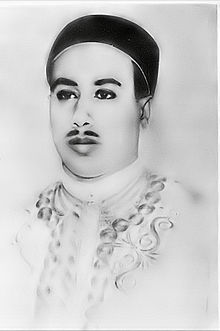Hasan as-Senussi
| Hasan as-Senussi | |
|---|---|
| Crown Prince of Libya | |
 |
|
| Predecessor | Idris I |
| Successor | Prince Muhammad |
| Born | 1928 Benghazi, Libya |
| Died | 28 April 1992 (aged 64) Westminster, UK |
| Burial | Jannat al-Baqi, Medina, Saudi Arabia |
| Spouse | Sheikha Fawzia bint Tahir |
| Issue | Mohammed El Senussi |
| House | Senussi |
| Father | Prince Muhammad al-Rida |
| Mother | Imbaraika al-Fallatiyya |
|
Styles of Crown Prince Hasan as-Senussi |
|
|---|---|
| Reference style | His Royal Highness |
| Spoken style | Your Royal Highness |
| Alternative style | Sir |
Sayyid Hasan ar-Rida al-Mahdi as-Senussi (1928 – 28 April 1992) was the crown prince of the Kingdom of Libya from 26 October 1956 to 1 September 1969, when the monarchy was abolished.
Hasan was born in 1928 the fifth son of Muhammad ar-Ride as-Senussi (1890–1955, the brother of the then emir of Cyrenaica, Idris of Libya) and his tenth wife Imbaraika al-Fallatiyya. He was educated at Al-Taj, Kufra and Al-Azhar University in Cairo, Egypt.
On 24 December 1951, Libya became independent. Following the death of his father, he was nominated Crown Prince by his uncle King Idris I on 26 October 1956.
The events of September 1969, proved to be pivotal both for Crown Prince Hasan and for Libya. As Crown Prince, Hasan was first in line succeed to the Libyan throne. The ailing Idris presented a signed document on 4 August 1969 to the President of the Libyan Senate, whereby Idris was to abdicate in favour of the Crown Prince. The instrument of abdication specified 2 September, the date when the King undertook formally to stand down. Indeed, the Crown Prince was already exercising regal powers in the name of King Idris, in the run up to 2 September. However, on 1 September, while Idris was out of the country undergoing medical treatment, a group of Libyan army officers, among them Colonel Muammar al-Gaddafi, staged a rebellion and announced that King Idris was deposed. Since King Idris I was unable to complete the term of his reign as envisaged by his instrument of abdication Hasan never actually became king. His legacy, however, was in his role of Crown Prince, exercised between 1956 and 1969, towards the end of which he was the de facto ruler of Libya. As Crown Prince, he repeatedly undertook official trips abroad, notably to negotiate the purchase of U.S.-built jet fighters from the Kennedy Administration for the Libyan Air Force.
...
Wikipedia
